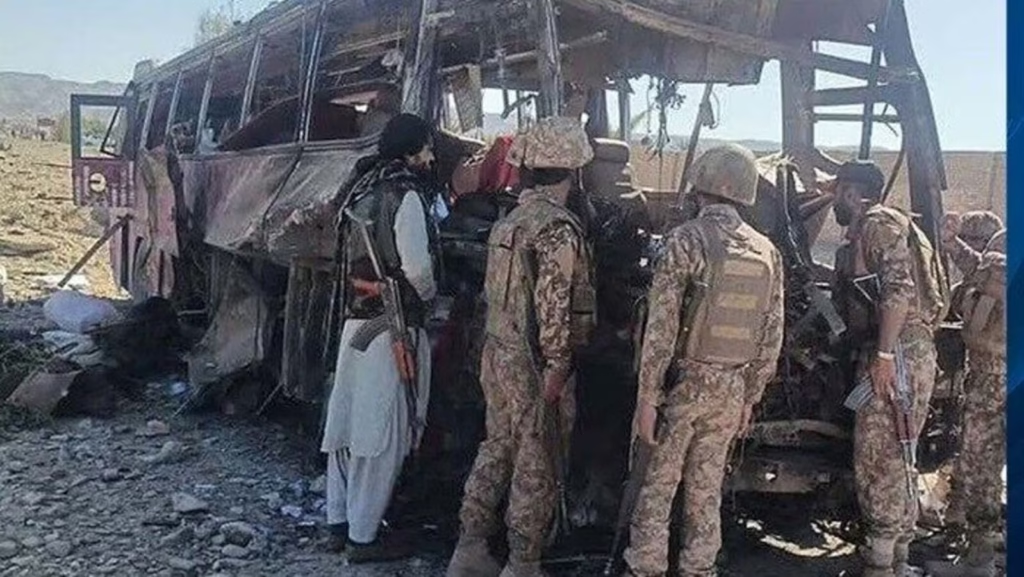Five Killed as Bomber Targets Buses Carrying Security Forces in Pakistan
A devastating terrorist attack in Pakistan has claimed the lives of five individuals and left several others injured after a suicide bomber targeted buses carrying security personnel. The attack, which took place on a busy highway, has once again underscored the persistent security challenges in the region. As authorities work to uncover the full extent of the damage and determine who is responsible, the incident has reignited concerns about the ongoing threats posed by extremist groups.
Details of the Attack
The attack occurred when a suicide bomber rammed an explosive-laden vehicle into a convoy of buses transporting security forces. The explosion was powerful enough to destroy multiple vehicles, shatter windows in nearby buildings, and cause severe injuries among passengers. Eyewitnesses described the horrifying scene, with flames engulfing the buses and thick plumes of smoke rising into the sky. Emergency response teams and law enforcement officials rushed to the scene, working tirelessly to rescue survivors and transport the wounded to nearby hospitals.

Security experts believe the attacker may have been part of a well-coordinated plan, indicating the possibility of intelligence leaks or lapses in security measures. The incident has prompted an immediate review of security protocols, especially for convoys transporting military and law enforcement personnel.
Casualties and Injuries
Initial reports confirm that at least five people were killed in the attack, including security personnel and civilians caught in the blast. However, the death toll may rise as several victims remain in critical condition. Hospitals in the vicinity have been placed on high alert, with medical teams working around the clock to provide treatment to the injured. The explosion also caused collateral damage, injuring bystanders and destroying private property.

Authorities have urged citizens to come forward with any information that could aid the investigation. Meanwhile, families of the victims are mourning their loss, calling for justice and stricter measures to prevent such incidents in the future.
Responsibility and Investigation
No group has immediately claimed responsibility for the attack. However, authorities suspect the involvement of extremist organizations that have carried out similar attacks in the past. The Pakistani government has launched an extensive investigation, vowing to bring the perpetrators to justice. Security forces are conducting intelligence operations, analyzing surveillance footage, and tracking communication channels that may lead to those responsible.
The country has seen a rise in militant activity in recent months, with security analysts pointing to the resurgence of terrorist networks along its borders. Law enforcement agencies are now focused on dismantling these groups and preventing further attacks. Officials have also assured the public that all necessary measures will be taken to protect both civilians and military personnel.
Government and Public Response
The Pakistani government has condemned the attack, calling it an act of cowardice aimed at destabilizing the nation. In an official statement, the Prime Minister expressed his condolences to the families of the victims and reaffirmed his administration’s commitment to eradicating terrorism. He assured the public that those behind the attack would face swift justice.
High-ranking military officials have also vowed to intensify counterterrorism operations, ensuring that such incidents do not occur again. The attack has led to a surge in public outrage, with citizens demanding stronger security measures. Protests have erupted in several cities, with people calling for a more aggressive approach to dealing with extremist groups. Many believe that intelligence agencies must enhance their efforts to intercept threats before they materialize.
Impact on National Security
This attack is part of a concerning trend of rising insurgent activities in Pakistan, particularly in regions affected by militant organizations. Over the past year, multiple high-profile attacks have targeted security forces, government officials, and civilians, exposing vulnerabilities in the nation’s security framework. The latest bombing highlights the need for a more comprehensive counterterrorism strategy that not only focuses on immediate threats but also addresses the root causes of extremism.
Military analysts stress that the government must adopt a multi-faceted approach, combining intelligence-sharing, enhanced border security, and community engagement to prevent radicalization. Additionally, there is a growing call for stronger international cooperation to tackle the financing and recruitment networks that sustain terrorist organizations.
International Reactions
The international community has expressed solidarity with Pakistan following the attack. Neighboring countries and global organizations have condemned the bombing, emphasizing the need for collective efforts to combat terrorism. The United Nations has reiterated its support for Pakistan in its fight against extremism, calling for increased collaboration among nations to address security threats.
Several world leaders have reached out to Pakistani officials, offering assistance in counterterrorism operations. Countries with advanced surveillance and intelligence capabilities have pledged to share relevant data that could help track down those responsible. As Pakistan grapples with the aftermath of the attack, it remains crucial for the country to strengthen its ties with allies who can contribute to its security efforts.
Counterterrorism Measures and Future Steps
In response to the attack, authorities are focusing on tightening security in high-risk areas, enhancing intelligence-sharing mechanisms, and conducting targeted operations against known terrorist hideouts. The government has announced plans to deploy additional security forces in regions prone to insurgent activity, ensuring greater vigilance and rapid response capabilities.
Counterterrorism units are being reinforced, with new training programs aimed at equipping security personnel with the latest techniques to identify and neutralize threats. Additionally, efforts are being made to increase surveillance in key areas, using technology such as drone monitoring and AI-driven threat detection systems.
However, many experts argue that counterterrorism efforts must go beyond immediate security measures. Addressing the socio-economic factors that fuel radicalization is essential in ensuring long-term stability. This includes investing in education, creating employment opportunities, and engaging with communities to counter extremist ideologies.
Conclusion
The tragic attack on security forces in Pakistan serves as a grim reminder of the persistent terrorist threat facing the country. As the nation mourns the lives lost, it must also take decisive action to prevent future attacks. Strengthening intelligence networks, enhancing security measures, and fostering international cooperation will be key in overcoming this challenge.
While the resilience of the Pakistani people remains strong, the need for lasting peace and security has never been more urgent. The government must act swiftly and decisively to ensure that such acts of violence do not become a recurring nightmare. Only through a comprehensive and strategic approach can Pakistan hope to build a safer and more secure future for its citizens.
A devastating terrorist attack in Pakistan has claimed the lives of five individuals and left several others injured after a suicide bomber targeted buses carrying security personnel. The attack, which took place on a busy highway, has once again underscored the persistent security challenges in the region. As authorities work to uncover the full extent of the damage and determine who is responsible, the incident has reignited concerns about the ongoing threats posed by extremist groups.
Details of the Attack
The attack occurred when a suicide bomber rammed an explosive-laden vehicle into a convoy of buses transporting security forces. The explosion was powerful enough to destroy multiple vehicles, shatter windows in nearby buildings, and cause severe injuries among passengers. Eyewitnesses described the horrifying scene, with flames engulfing the buses and thick plumes of smoke rising into the sky. Emergency response teams and law enforcement officials rushed to the scene, working tirelessly to rescue survivors and transport the wounded to nearby hospitals.
Security experts believe the attacker may have been part of a well-coordinated plan, indicating the possibility of intelligence leaks or lapses in security measures. The incident has prompted an immediate review of security protocols, especially for convoys transporting military and law enforcement personnel.
Casualties and Injuries
Initial reports confirm that at least five people were killed in the attack, including security personnel and civilians caught in the blast. However, the death toll may rise as several victims remain in critical condition. Hospitals in the vicinity have been placed on high alert, with medical teams working around the clock to provide treatment to the injured. The explosion also caused collateral damage, injuring bystanders and destroying private property.
Authorities have urged citizens to come forward with any information that could aid the investigation. Meanwhile, families of the victims are mourning their loss, calling for justice and stricter measures to prevent such incidents in the future.
Responsibility and Investigation
No group has immediately claimed responsibility for the attack. However, authorities suspect the involvement of extremist organizations that have carried out similar attacks in the past. The Pakistani government has launched an extensive investigation, vowing to bring the perpetrators to justice. Security forces are conducting intelligence operations, analyzing surveillance footage, and tracking communication channels that may lead to those responsible.
The country has seen a rise in militant activity in recent months, with security analysts pointing to the resurgence of terrorist networks along its borders. Law enforcement agencies are now focused on dismantling these groups and preventing further attacks. Officials have also assured the public that all necessary measures will be taken to protect both civilians and military personnel.
Government and Public Response
The Pakistani government has condemned the attack, calling it an act of cowardice aimed at destabilizing the nation. In an official statement, the Prime Minister expressed his condolences to the families of the victims and reaffirmed his administration’s commitment to eradicating terrorism. He assured the public that those behind the attack would face swift justice.
High-ranking military officials have also vowed to intensify counterterrorism operations, ensuring that such incidents do not occur again. The attack has led to a surge in public outrage, with citizens demanding stronger security measures. Protests have erupted in several cities, with people calling for a more aggressive approach to dealing with extremist groups. Many believe that intelligence agencies must enhance their efforts to intercept threats before they materialize.
Impact on National Security
This attack is part of a concerning trend of rising insurgent activities in Pakistan, particularly in regions affected by militant organizations. Over the past year, multiple high-profile attacks have targeted security forces, government officials, and civilians, exposing vulnerabilities in the nation’s security framework. The latest bombing highlights the need for a more comprehensive counterterrorism strategy that not only focuses on immediate threats but also addresses the root causes of extremism.
Military analysts stress that the government must adopt a multi-faceted approach, combining intelligence-sharing, enhanced border security, and community engagement to prevent radicalization. Additionally, there is a growing call for stronger international cooperation to tackle the financing and recruitment networks that sustain terrorist organizations.
International Reactions
The international community has expressed solidarity with Pakistan following the attack. Neighboring countries and global organizations have condemned the bombing, emphasizing the need for collective efforts to combat terrorism. The United Nations has reiterated its support for Pakistan in its fight against extremism, calling for increased collaboration among nations to address security threats.
Several world leaders have reached out to Pakistani officials, offering assistance in counterterrorism operations. Countries with advanced surveillance and intelligence capabilities have pledged to share relevant data that could help track down those responsible. As Pakistan grapples with the aftermath of the attack, it remains crucial for the country to strengthen its ties with allies who can contribute to its security efforts.
Counterterrorism Measures and Future Steps
In response to the attack, authorities are focusing on tightening security in high-risk areas, enhancing intelligence-sharing mechanisms, and conducting targeted operations against known terrorist hideouts. The government has announced plans to deploy additional security forces in regions prone to insurgent activity, ensuring greater vigilance and rapid response capabilities.
Counterterrorism units are being reinforced, with new training programs aimed at equipping security personnel with the latest techniques to identify and neutralize threats. Additionally, efforts are being made to increase surveillance in key areas, using technology such as drone monitoring and AI-driven threat detection systems.
However, many experts argue that counterterrorism efforts must go beyond immediate security measures. Addressing the socio-economic factors that fuel radicalization is essential in ensuring long-term stability. This includes investing in education, creating employment opportunities, and engaging with communities to counter extremist ideologies.
Conclusion
The tragic attack on security forces in Pakistan serves as a grim reminder of the persistent terrorist threat facing the country. As the nation mourns the lives lost, it must also take decisive action to prevent future attacks. Strengthening intelligence networks, enhancing security measures, and fostering international cooperation will be key in overcoming this challenge.
While the resilience of the Pakistani people remains strong, the need for lasting peace and security has never been more urgent. The government must act swiftly and decisively to ensure that such acts of violence do not become a recurring nightmare. Only through a comprehensive and strategic approach can Pakistan hope to build a safer and more secure future for its citizens.
Do follow Uae stories for more Updates












